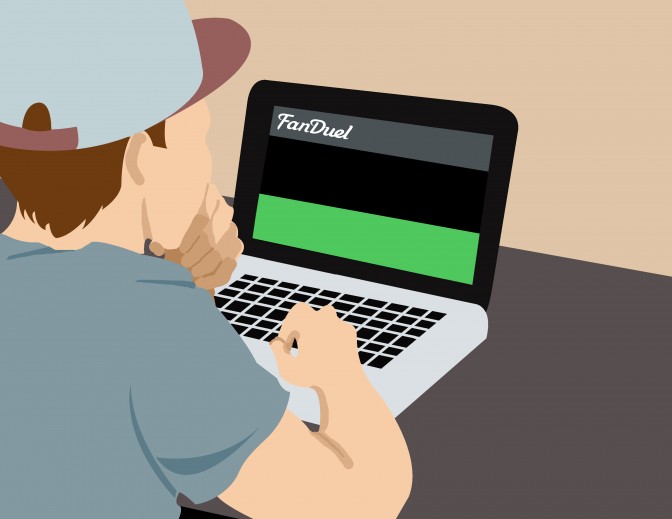Both professional and collegiate sports generate billions of dollars each year through fantasy gaming. The rapidly growing audience and steady rise in popularity continue to make fantasy sports one of the most prominent aspects behind every season.
Money is a large part of forming these ideal fantasy teams, causing the game to dance on the fine line of gambling. Unrestricted online sports gambling remains illegal in the United States, but fantasy sports are exempt under the Unlawful Internet Gambling Enforcement Act of 2006.
The precedent defines gambling as placing, receiving or otherwise knowingly transmitting a bet or wager by any means that at least partially involve the Internet and such betting is unlawful under state or federal law.
Daily fantasy sports, however, do not meet this criteria because it is considered a game of skill—one must recognize a player’s abilities and statistics, and understand how to put a proper team together.
How teams perform are incumbent to how the professional and collegiate players and how they do on that particular day. The fantasy sport player has no say in how the athletes perform.
“With fantasy football or fantasy anything it’s kind of like ‘Oh no, this isn’t really gambling, I can do fine. I just have to beat the guy next to me,’” said Jonathan Polus, 26, a CSUN campus missionary. “But they’re still gambling.”
There are also those that say it’s entirely a game of skill, that it does require a great deal of knowledge in order to succeed.
“Honestly, I think it is a skill, because not everybody can do it,” said Jesse Azucena, 20, an undecided major. “That’s a lot of statistics to read through, injury reports, which teams are good at defense, stuff like that.”
Though it is considered a game of skill, many who do play lose more money than they make. Daily Fantasy Sports 101’s No. 1 fantasy sport site DraftKings says it will be dispersing “$1 billion guaranteed cash and prizes this year” while FanDuel—the No. 2 site—reported that $560 million were awarded to its users in 2014 and two billion will be paid out this year.
However, more people seem to be losing money than winning part of that $1 to $2 billion promised.
“By the time the season’s over, I think I was down almost a thousand dollars or twelve hundred bucks or something,” said Nelson Rivera, 35, a communications major. “It wasn’t something I wanted to repeat again.”
The promise of winning back that lost money keeps players coming back. Commercialized victories promise very large payouts, but the player has to keep playing in order to do so.
“It’s just kind of more like a sneaky way of people still taking your money in my mind,” Polus said.
So who do these sites target in order to keep their multibillion dollar companies thriving? Who is it that they want to keep coming back?
DraftKings’ target demographic is 18-49 year-old males with a college education, early-adopter males who are actively playing fantasy sports and are at the forefront of online gaming, sports, technology, music and trendy-lifestyle events, while also possessing disposable income, Adweek reported.
If the targeted demographic has a disposable income, it seems unlikely that the average college student would be able to consistently play.
“I think I tend to lose money just a little bit more, just because there’s a couple players that just never come through,” Azucena said. “They’re supposed to do good, but they never come though.”
Some go on to play with complete strangers, while others play with their friends.
“I don’t do it with friends because they never pay up,” Azucena said. “So when I do it online, it’s way better and plus there’s a limited amount of people.”
However, some enjoy being in a competitive space with their friends.
“It’s fun to have a pool and try to guess who’s getting into the 64 team selection, because you can even bet on that,” Rivera said. “You can even bet on what teams get into just the selection as opposed to who’s going to win per game and the point spread and all that.”
Players who join because their friends play are more compelled to play and match what their friends have put up.
“There is definitely incentive when your buddies are in it, when somebody tells you ‘Hey man, I won 30 bucks doin’ this pool so why don’t you join it?’” Rivera said. “Well, my 30 bucks turned into one thousand dollars and that was it—no gas money.”
With the odds of someone actually winning the million dollar prize fairly low, many people form private leagues to play the same game.
“We just all draft, hang out and have a good time. So we don’t play for money per say, we have a belt that we made and whoever wins that year gets it,” Polus said.
It is a safer alternative to the controversial game that fantasy sports are. The objective is still the same, while the outcome is different. The line bordering gambling is removed because there is no longer any monetary value on the game, but the same amount of skill is still required.
“I have certain players that are favorites and there are certain times where some of it comes down to just strategy of it,” Polus said. “There is some strategy involved in deciding to draft more running backs, more wide receivers. Quarterbacks are always kind of interesting every year.”
This may be the safest way to play the game, but the $1 million paid active users that FanDuel has receive an entirely different experience from the game. Their experience comes with loss, revenue and, most recently, scandal.
In this past week, a DraftKings employee admitted on a fantasy sports message board that he had prematurely released data crucial to the site’s biggest contest, the Wall Street Journal reported. In that same week, he won $350,000 on FanDuel, which has been acknowledged by both companies. Both companies say the employee did not benefit from the having early access to the data and the leak was an accident.
“I think the guys who win the big money are the ones who have some tips coming from somewhere; it has to be,” Rivera said. “The odds of somebody winning the million dollar payout prize; it’s like trying to buy a lottery ticket and predicting [you’re] going to win the billion dollars.”
This scandal is bringing more attention to the gambling and non-gambling debate of fantasy sports. Nevada regulators ruled that playing daily fantasy sports should be considered gambling and no longer a game of skill Oct. 15, a week after the leak and inside victory occurred. Websites like FanDuel and DraftKings were ordered to stop operating in the state until gambling licences were received, the New York Times reported.
Nevada now joins five other states who have deemed online fantasy sports illegal, but may have the strongest impact as it has the nation’s only active sports betting. However, high the amount of scrutiny, the world of fantasy sports is still bringing in billions of dollars and millions of players.
“I mean to be real it’s gambling nonetheless, but it’s the safe man’s gambling because you can do it from the privacy of your home,” Rivera said.












